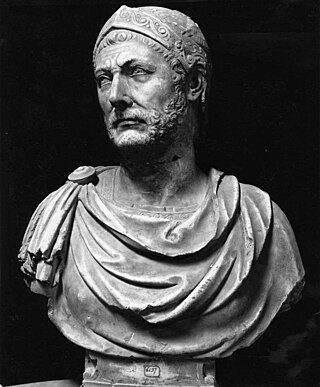
Hannibal was a Carthaginian general and statesman who commanded the forces of Carthage in their battle against the Roman Republic during the Second Punic War.
Gnaeus Cornelius Scipio Calvus was a Roman general and statesman during the third century BC. He played a major part in the Second Punic War, establishing Roman rule in the east of the Iberian peninsula and tying up several Carthaginian armies to keep them from reinforcing Hannibal.

The Chindits, officially known as Long Range Penetration Groups, were special operations units of the British and Indian armies which saw action in 1943–1944 during the Burma Campaign of World War II.

Krabi-Krabong is a weapon-based martial art from Thailand. It is closely related to other Southeast Asian fighting styles such as Pencak Silat Indonesia, Burmese banshay and Cambodian kbach kun boran. The royal bodyguard corps of the late King Bhumibol Adulyadej were said to be highly trained in krabi-krabong.
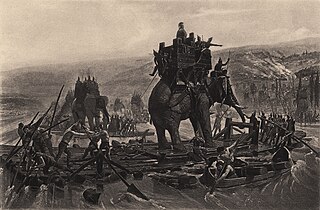
A war elephant was an elephant that was trained and guided by humans for combat. The war elephant's main use was to charge the enemy, break their ranks, and instill terror and fear. Elephantry is a term for specific military units using elephant-mounted troops.

The Surin Elephant Round-up is a cultural festival held every year in Surin Province, Isan, Thailand. Usually the event is organized during the third week of November on the weekend. The festival has its origins in the royal hunts which were conducted in Surin Province during medieval times. The indigenous residents of Surin, the Kuy, have been traditional practitioners of corralling elephants and training them as working animals. When the Ayutthaya Kingdom came into power these hunts were converted into a public extravaganza and wild elephants were replaced with tame ones. The festival, in its contemporary form, was first organized in the 1960s when civil war in Cambodia and the steady decline in economic value of elephants forced the elephant handlers (mahouts) to seek occupations in the entertainment and tourism industry.
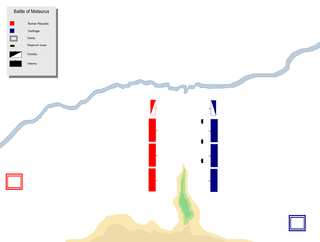
The Battle of the Metaurus was a pivotal battle in the Second Punic War between Rome and Carthage, fought in 207 BC near the Metauro River in Italy. The Carthaginians were led by Hasdrubal Barca, brother of Hannibal, who was to have brought siege equipment and reinforcements for Hannibal. The Roman armies were led by the consuls Marcus Livius, who was later nicknamed the Salinator, and Gaius Claudius Nero.
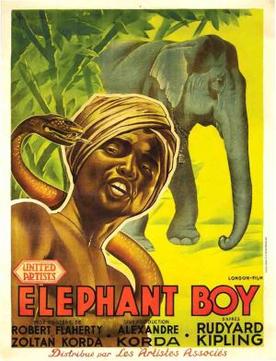
Elephant Boy is a 1937 British adventure film starring Indian-born actor Sabu in his film debut. Documentary filmmaker Robert J. Flaherty, who produced some of the Indian footage, and supervising director Zoltan Korda, who completed the film, won the Best Director Award at the Venice Film Festival. The film was made at the London Films studios at Denham, and in Mysore, India, and is based on the story "Toomai of the Elephants" from Rudyard Kipling's The Jungle Book (1894).
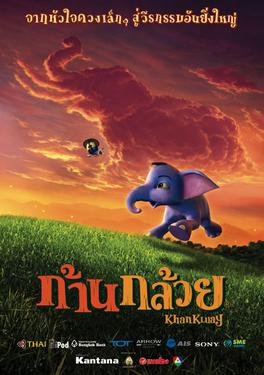
Khan Kluay is a 2006 Thai animated adventure film set in Ayutthaya-era Siam about a Thai elephant who wanders away from his mother and becomes the war elephant for King Naresuan. It is based on the story Chao Phraya Prap Hongsawadee by Ariya Jintapanichkarn. The film took three years to make, and was released on May 18, 2006, in Thailand. In 2007, the film was released as The Blue Elephant in the United States on September 2, and as Jumbo in India in December 25.
Balarama was the lead elephant of the Mysore Dasara procession and carried the idol of goddess Chamundeshwari on the fabled Golden Howdah thirteen times between 1999 and 2011. Balarama was a bull born about 1958 and was accompanied in the procession by other Dasara Elephants. Of the many elephants participating, Balarama was one of the star attractions when he carried on his back the sacred idol of goddess Chamundeshwari in the 750 kilograms (1,650 lb) golden howdah on the auspicious 10th day of Dasara celebrations.
Drona was one of the lead Dasara Elephants of the Jamboo Savari of Mysore Dasara. He carried the Golden Howdah for a record 18 years consecutive years between 1981 and 1997, before being electrocuted while grazing in 1998. Of all the carrier elephants since the 20th-century, he is considered the best "because he possessed an excellent ability to learn and correct himself".
Parbati Barua is an Indian animal conservation activist and a mahout, She was one of nine children to late Prakritish Chandra Barua of the Royal Family Of Gauripur. Prakritish was the last member of the Rajahs of Gauripur to hold power. She came to the limelight after the BBC created the documentary "Queen of the Elephants" based on her life, along with the companion book by Mark Shand. She resided in Guwahati and was also a member of the Asian Elephant Specialist Group, IUCN. She was the sister of Pratima Barua Pandey and niece of filmmaker Pramathesh Barua of Devdas fame.

The Church of the Province of Myanmar in Asia is a member church of the Anglican Communion. The province comprises the entire country of Myanmar. The current archbishop of Myanmar and bishop of Yangon is Stephen Than Myint Oo.

Jumbo is a 2008 Indian 3D computer-animated adventure film directed by Kompin Kemgumnird, produced by Percept Picture Company and features the voices of Akshay Kumar, Lara Dutta, Dimple Kapadia, Rajpal Yadav, Asrani, and Gulshan Grover. Jayveer Singh aka Jumbo, a little elephant, which tries to find his Father and the journey of finding his father made him a war elephant. The film is a Hindi remake and Hindi dubbed version of the 2006 Thai film Khan Kluay, which is based on "Chao Praya Prab Hongsawadee" by Ariya Jintapanichkarn.

U Phoe Kyar is considered one of the top Burmese authors and education reformists in 20th century Myanmar. He is regarded as the father of Burmese short stories, a key member of the Nationalist Education movement of the 1930s and also a literary genius. His works continue to be popular with both the young and old in Myanmar.
Thado Minbya was the founder of the Kingdom of Ava. In his three plus years of reign (1364–67), the king laid the foundation for the reunification of Central Burma, which had been split into Pinya and Sagaing kingdoms since 1315. He also founded the capital city of Ava (Inwa) in 1365, which would remain the country's capital for most of the following five centuries. The young king restored order in central Burma, and tried to stamp out corrupt Buddhist clergy. He died of smallpox while on a southern military expedition in September 1367.
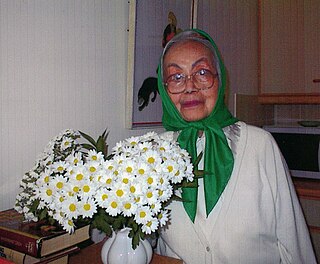
Ma Than E Fend was a prominent Burmese singer in the early 20th century, known by her stage name Bilat Pyan Than (ဘိလပ်ပြန်သန်း). Also, she was also an international civil servant, who spent a long career in the United Nations.
Mingyi Swa was heir apparent of Burma from 1581 to 1593. The eldest son of King Nanda of the Toungoo Dynasty led three out of the five Burmese invasions of Siam between 1584 and 1593, all of which ended in complete failure. He died in action during the fifth invasion in 1593. In prevailing Thai history, he was killed in single combat by King Naresuan. However no other accounts, including the earliest Siamese records and European accounts, mention a formal elephant duel between the two. The Burmese chronicles say Swa was felled by a Siamese mortar round.
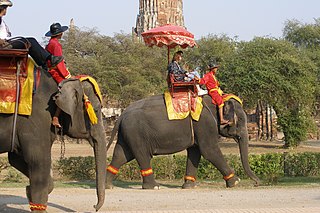
The elephant has been a contributor to Thai society and its icon for many centuries. The elephant has had a considerable impact on Thai culture. The Thai elephant is the official national animal of Thailand. The elephant found in Thailand is the Indian elephant, a subspecies of the Asian elephant. In the early-1900s there were an estimated 100,000 captive elephants in Thailand. In mid-2007 there were an estimated 3,456 captive elephants left in Thailand and roughly a thousand wild elephants. By 2017 the number of captive elephants had risen to an estimated 3,783. The elephant became an endangered species in Thailand in 1986.

The Emerald Jungle is a 1934 Burmese black-and-white silent film about a spoiled urbanite fleeing to the Jungle with a bunch of stunts and actions. But what would also make for an interesting film is the story of the loss and restoration of director Maung Tin Maung's 1934 masterpiece.













